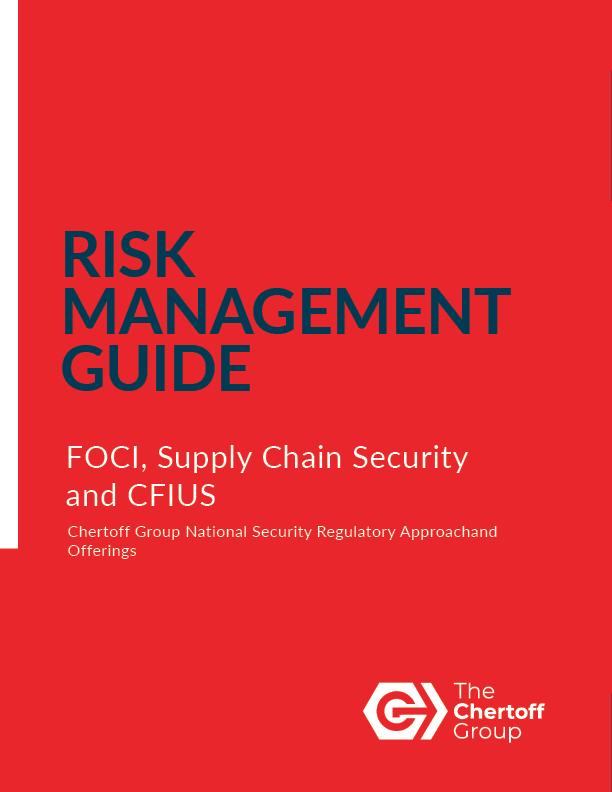- The Chertoff Group
- Geopolitical & Regulatory Risk
Geopolitical & Regulatory Risk Services
Helping organizations develop geopolitical and regulatory risk management strategies and meet evolving requirements.
NAVIGATING GLOBAL RISK
Managing Geopolitical & Regulatory Challenges
Our team includes former regulators, national security practitioners and supply chain experts. We specialize in work with U.S. domestic and multinational companies operating in Technology, Defense and Aerospace, Transportation and other Critical Infrastructure sectors.
While all risk cannot be eliminated, The Chertoff Group illuminates risk, helping you to make better informed decisions and protect assets.
STRATEGIC SOLUTIONS
Regulatory Compliance
SUPPLY CHAIN
Security & Resilience








SECURING INVESTMENTS
Geopolitical Risk Evaluation
We Help You Anticipate What's Next
Legal, political and security changes in global markets create significant operational and strategic risks. Our national security and regulatory experts conduct red teams to identify potential U.S. government concerns and analyze geopolitical developments. We monitor global risks from regulatory shifts, political instability and security threats. We guide you to navigate complex geopolitical environments and inform strategic decision making across a spectrum of concerns including:
Geopolitical Risk Analysis
We analyze and monitor dynamics in specific regions where you operate and provide clear strategies to reduce exposure and protect people and assets. We track conflict, unrest and trade disruptions to help you anticipate and prepare for impacts.
Tracking Regulation and Policy
We track regulatory and policy developments across key markets, including technology and data privacy sectors. We provide guidance about how to adapt to new requirements such as the EU Digital Markets Act and the status of the U.S. Open Markets Act.
Trade and Tariff Risk Management
Global trade tensions and tariff policies create significant operational and financial risks. Our team assesses supply chain impacts and operations, providing strategies to mitigate risks and ensure compliance with federal trade standards.
DID YOU KNOW?
Product Security and Assurance services help companies assess and mitigate pressing technology product risks.
MITIGATION SUPPORT
Using Our Insights to Your Advantage
We help organizations protect what matters most by managing risks and building resilience. We create clear, actionable strategies that keep businesses secure and prepared. Our team aligns security with business goals, ensuring companies can adapt to challenges and grow with confidence. Whether it’s protecting assets, meeting regulations, or planning for the future, our focus is on delivering simple, effective solutions that make a lasting impact.
With our unique combination of regulatory expertise and insights into agency perspectives, The Chertoff Group works with companies to shape mitigation agreements that meet business and U.S. Government needs.
STRATEGIC ADVISORY SERVICES
How We Can Help
Risk Profiling
Illuminate supply chain risks and develop risk management strategies to address vulnerabilities.
Managed Services
Provide support to augment supply chain resilience efforts and proactively mitigate potential disruptions.
Mitigation Strategies
Demonstrate supply chain integrity and product assurance with our Product Assurance Playbook.
Strategic Outreach
Engage our unique relationships across U.S. government agencies.
Compliance & Monitoring
Assess companies’ compliance with sanctions and assess business impact from tariffs.
Our Geopolitical & Regulatory Risk Partners























